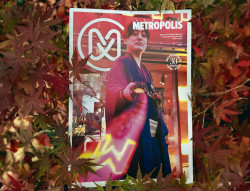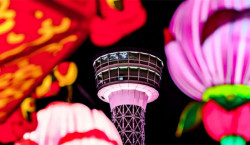
Originally published on metropolis.co.jp on December 2009
Despite only having been in Tokyo for a month, Japanophile Thad Johnson is already doing his part to ensure the survival of the country’s venerable—and oft-neglected—New Year’s traditions. The Baltimore native, who is on a year-long intensive language program, has decried what he calls the “slow death and secularization of Japan’s timeless and unique cultural heritage.”
“The first thing I got was this little white two-ball snowman thing,” Johnson told The Negi, lifting a plastic novelty item from a bookshelf at his guesthouse in Asakusa. “It has an orange for a hat, which is, you know, symbolic. But this douchebag from Italy who lives on the first floor ate the orange.
“And this bamboo thing, it’s like really traditional,” continued the 23-year-old, pointing to another item that he had recently purchased at Daiso. “Bamboo is a big thing for all Asians, but of course Japanese too. Chopsticks are made from bamboo—did you know that? And strength… and, being like, bamboo and really grounded, like with deep roots and, you know, green… that’s kind of at the core of it, if I explain it simply.”
Johnson said he sees the continued disintegration of Japan’s cultural heritage as inevitable—unless people like him step up to the challenge. “I mean, this needs to be passed on to the next generation. I might be a dad or some shit someday. And my wife will be, like, Japanese and hot. I must respect her heritage… I mean, it’s my culture too. It’s for me, my children and my hot wife.”
Seeking to ease the crush of New Year shrine visitors while also making religious participation more accessible to tech-savvy Tokyoites, a group of leading Shinto priests has authorized the development of a new iPhone application. Called “Go-en to the Temple,” the app allows believers to express their hatsumode prayers via mobile phone. The application displays a picture of Meiji Jingu Shrine, and when the user claps in front of the device, ¥5 is immediately sent via an online payment service to the developers and temple.
Meiji Jingu Head Priest Takai Shinjiru lauded the new device as a way for Tokyoites to take time from their busy, amoral lives and show respect to their deceased ancestors. “Of course, those more fervent believers may wish to adjust the preference settings to higher denominations to ensure the eternal spirits can rest easy.”
A night of revelry took a tragic turn on Saturday when Iyada Oto, a worker at karaoke chain TenGoku, collapsed to the floor of a booth in Shibuya. Paramedics were unable to revive the 21-year-old, who was found with blood trickling from his ears and nose. Initial autopsy results revealed that the victim had suffered brain hemorrhaging due to chronic overexposure to the Wham song “Last Christmas.” A postmortem MRI also showed severe internal head trauma and a loss of about a third of Oto’s normal brain mass.
“Constant, prolonged and incessant exposure to this romantic Christmas hit caused tiny lesions to form within the victim’s brain, and further exposure exacerbated the condition,” said Dr. Mimi Itai, a brain specialist familiar with the case. “The average person only hears the song seven-eight times a day during the Christmas season, but Mr. Oto was exposed to far greater frequencies [than that].”
Dr. Itai offered a further word of caution: “We should also be wary of ‘Happy Christmas (War Is Over)’ or, really, anything by John Lennon.”
Christmas Event Planners Focus on Eliminating the Homeless
The organizers of this year’s Christmas-themed events in Tokyo are unanimous in their refrain: something must be done about the homeless.
“We’re spending millions and millions of yen to make this beautiful display of Christmas love, light and hope,” said Ai Hidoi, organizer of ‘Sparkle Christ,’ an illumination display and water fountain in Ginza. “But we’ve been plagued by homeless people who keep trying to sleep in the alcoves between the lights. Apparently, it’s quite warm in there.”
Unfortunately, solutions have not been forthcoming. “We’re retrofitting the large illuminated letters ‘LOVE’ with barbed wire to keep them out. But it’s a losing battle.”
A young couple interviewed on a nearby street agreed that something needed to be done to address the issue. “It’s really creepy trying to make out with a guy peeing nearby. Actually I’m not sure he’s homeless. He might just be a taxi driver or businessman. But you get my point. This holiday is about love, not homeless people.”
- Emperor’s B-Day Marked With Kegger, Chrysanthemum Jell-O Shots at Palace
- Love Hotel Offers 20 Percent Xmas Discount to Practicing Christians and “Missionaries”
- Maker of Japanese Folding Tables Admits to Anti-Foreign Knee Design
- Am/Pm Purchased By Family Mart; New Owners Promise Continued 24-Hour Shitty Food
- Pepsi Japan Releases Pine Tree-Flavored Drink for Christmas








